Search Results
Showing results 141 to 160 of 289
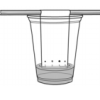
Busted by Biology
Source Institutions
In this two-part activity, learners will extract their own DNA from their cheek cells and learn how DNA is analyzed and used to solve crimes.

Oil Spill Solutions
Source Institutions
In this activity, learners explore how environmental engineers might approach solving the problem of an oil spill.

Viral Packaging
Source Institutions
In this activity, learners create virus models, including nucleic acid and proteins, using simple materials. This resource includes information about virus structure and gene therapy.
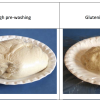
Wheat Evolution: Dough Washing
Source Institutions
In this activity (Page 22 of PDF), learners investigate the evolution of wheat by washing different types of dough with water and comparing the results.
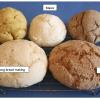
Wheat Evolution: Dough Rising and Baking
Source Institutions
In this activity (Page 25 of PDF), learners investigate the evolution of wheat by creating dough from different flours, observing the samples of dough as they rise, and then baking the dough.
No bones about it!
Source Institutions
This is an activity (located on page 3 of the PDF) about the mixture of materials in bone and how they affect its strength.
Building a Community From the Ground Up
Source Institutions
In this activity, a group of learners work collaboratively to design and construct a paper model showing the evolution of an environment through multiple stages, from prehistory through the modern cit
Hazardous Chemicals in Your Neighborhood
Source Institutions
In this environmental science lesson, learners will examine hazardous chemicals and their effects on human health and the environment.

Science at the Waterpark!
Source Institutions
This activity (on page 2 of the PDF under SciGirls Activity: Water Slides) is a full inquiry investigation into speed and motion and takes place at a water park.

Solar Water Heater
Learners work in teams to design and build solar water heating devices that mimic those used in residences to capture energy in the form of solar radiation and convert it to thermal energy.

Plastics the Second Time Around
Source Institutions
In this activity, learners test and compare the physical properties of thermoplastic polymers. Learners compare different plastics based on their color, degree of transparency, texture, and density.

Trash Talkin'
In this activity, learners collect, categorize, weigh and analyze classroom trash and discuss ways that engineers have helped to reduce solid waste.
Guiding Light
Source Institutions
In this optics activity, learners use glass and water to demonstrate total internal reflection (TIR).
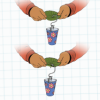
Breaking Point
Source Institutions
In this activity, learners build penetrometers to test leaf toughness. Biologists measure leaf toughness to study the feeding preferences of insects and bugs.
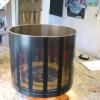
Bike Wheel Zoetrope
Source Institutions
In this activity (posted on April 18, 2011), learners follow the steps to construct a zoetrope, a device that produces an illusion of action from a rapid succession of static pictures, using a 16" bik

Design a Park
Source Institutions
In this activity, learners are invited to imagine the park of their dreams!

OBIS Oil Spill
Source Institutions
In this outdoor activity, learners simulate an oil spill using popcorn (both oil and popcorn float on water), and estimate the spill's impact on the environment.
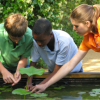
Nano Scavenger Hunt
Source Institutions
This is an activity (located on page 3 of PDF under Where's Nano? Activity) about identifying nanoscale objects and phenomena in today's world.

Dinosaur Breath
Through discussion and hands-on experimentation, learners examine the geological (ancient) carbon cycle.
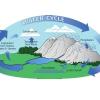
Moving Without Wheels
In a class demonstration, learners observe a simple water cycle model to better understand its role in pollutant transport.
